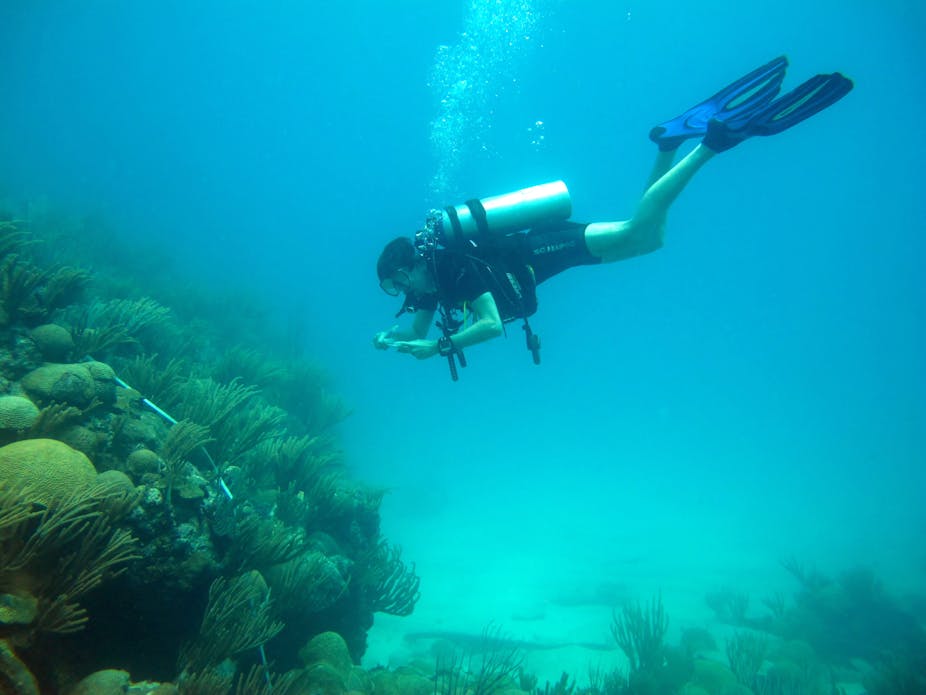Tiny particles of air pollution can stunt the growth of coral reefs, according to a [new study in Nature Geoscience](http://dx.doi.org/10.1038/ngeo1780](http://dx.doi.org/10.1038/ngeo1780).
Using coral records from the western Caribbean between 1880 and 2000, researchers from the UK, Australia and Panama have shown for the first time how polluted air – from human activities such as burning coal or wood, as well as volcanic eruptions – can slow coral growth.
Since the 1950s, coral at two sites in Panama and Belize appears to have been affected by industrial air pollution.
Fine airborne particles, or aerosols, help scatter incoming sunlight and create cloudier, more reflective conditions.
This can reduce the sunlight reaching the sea, which means cooler sea temperatures and reduced photosynthesis that combine to slow coral growth.
The researchers discuss how coral reefs are vulnerable to a wide range of threats, including run-off from coastal development and mass bleaching events linked to climate change.
However, they say their new findings show for the first time how important air pollution could be to coral reefs.
The air pollution study coincides with a new journal article in Nature Climate Change, warning that the world’s oceans have been acting as a giant sink for extra heat from global warming, especially over the past decade.
They say if that heat is released back into the atmosphere, the effects of climate could quickly get worse.
Masking a bigger problem
Leading international coral expert Professor Ove Hoegh-Guldberg from the University of Queensland said the new air pollution study was “an important contribution” to understanding coral reefs.
Professor Hoegh-Guldberg, who is coordinating the oceans chapter of the next Intergovernmental Panel on Climate Change report, said the research highlights one of his biggest concerns: complacency about global warming, which is being partly masked by the cooling effect of aerosols.
The air pollution study describes how after World War II, booming industrial expansion in North America and to a lesser extent Central and South America led to rising air pollution, which appears to have caused a marked fall in sea surface temperature.
When clean-air policies were introduced in the 1970s, aerosol emissions dropped significantly. Sea surface temperatures then stabilized and subsequently began to rise again.
That was good news then. But Professor Hoegh-Guldberg is concerned about what today’s air pollution is masking.
“Aerosols may reduce the rate at which temperatures are increasing today, but given the health impacts and need to reduce aerosols, we may eventually have to pay the elevated temperature ‘debt’ as we clear up aerosols.”
University of Southern Queensland Adjunct Professor Ian McPhail - a former chair of the Great Barrier Reef Marine Park Authority - said it was “a fascinating piece of work”.
“When it comes to looking after coral reefs, we tend to sweat over local issues like port development, dredging, nutrient flow from the land and so on,” Dr McPhail said.
“They’re all very important - but this is a reminder of some of the bigger regional and global atmospheric challenges we need to address too. We need to act on both those local and global fronts, and do it urgently.
"We must remember, we’re not just talking about the ecology of coral reefs, we’re also talking about the economy.
"Whether you’re talking about Belize - as this study does, which is home to the world’s second largest coral reef system - or you’re talking about Great Barrier Reef here in Queensland, these are places of extraordinary fauna and flora.
"That beauty and ecological diversity is what makes them major economic drivers for Belize and Australia alike. So the more we know about how these complex ecosystems work, the better we can protect them.”

